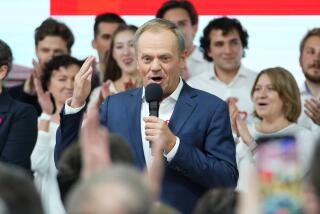70% Vote as Lithuania Elects a Post-Soviet Parliament
- Share via
MOSCOW — Lithuanians ventured from their unheated homes into cold, rainy streets Sunday to vote in their country’s first post-Soviet parliamentary elections, which pit conservative former Communists against anti-Russia nationalists.
Results were not available by late Sunday, but election officials said at least 70% of eligible citizens cast ballots. Political observers predicted that the 141-member Parliament, or Siemas, would remain divided but said either of the two main parties might be able to muster a working majority by forming a coalition with smaller centrist groups.
Sunday’s elections, the first since Lithuania gained independence from the Kremlin in August, 1991, could prove decisive in determining the pace of reform in the nation of 3.8 million on the shores of the Baltic Sea.
The outcome could also affect Lithuania’s attitude toward Russia, because the former Communists have called for a more cozy relationship and the nationalists have vowed to turn their backs on their powerful neighbor.
But most Lithuanians were expected to vote on a simpler, more immediately pressing issue: which party they think would best be able to negotiate deals for heating oil and gas this winter.
Unable to afford Russian fuel--once heavily subsidized by Moscow and now sold at world prices--Lithuania faces a bitterly cold winter. Apartments and office buildings have no heat, and kindergartens and hospitals are kept at a chilly 50 degrees.
Because of a critical shortage of gasoline, private cars have disappeared from the roads entirely, and ambulances and firetrucks respond only to dire emergencies, Russia’s Itar-Tass news agency has reported.
“And should it be surprising that leading up to the elections, there is plenty of apathy among the people?” a correspondent for the newspaper Komsomolskaya Pravda wrote from Vilnius, Lithuania’s capital.
“Left, right, green--even (Vladimir) Zhironovsky (a crackpot Russian nationalist) himself--just so we don’t need to sleep in sweaters,” he continued, summing up the voters’ mood a few days before the election.
About 17 parties sponsored candidates in the election. Of the 141 seats in Parliament, 71 were to be filled by local district elections and the rest awarded proportionally to parties winning more than 4% of the total popular vote.
The ballot also included a yes-no referendum on a new constitution. Official results will be announced early this week.
The two major parties, each expected to capture between 20% and 30% of the seats, fought a bitter campaign.
Led by Lithuania’s former Communist Party boss, Algirdas Brazauskas, the Democratic Labor Party accused the government of running the country’s shaky economy into the ground.
Under the leadership of Vytautus Landsbergis, the sardonic music historian who directed his country’s independence movement, Lithuania has looked resolutely westward, trying to build economic ties with European and Scandinavian countries. Landsbergis has called for a mandate to continue this policy.
But, fearful that confrontation with Moscow will mean another long, cold winter without oil or gas, many voters have apparently turned away from Landsbergis. Brazauskas, who wants to build a closer relationship with Russia and to slow the pace of economic reforms, has become one of the country’s most popular politicians, despite his Communist background.
More to Read
Sign up for Essential California
The most important California stories and recommendations in your inbox every morning.
You may occasionally receive promotional content from the Los Angeles Times.













